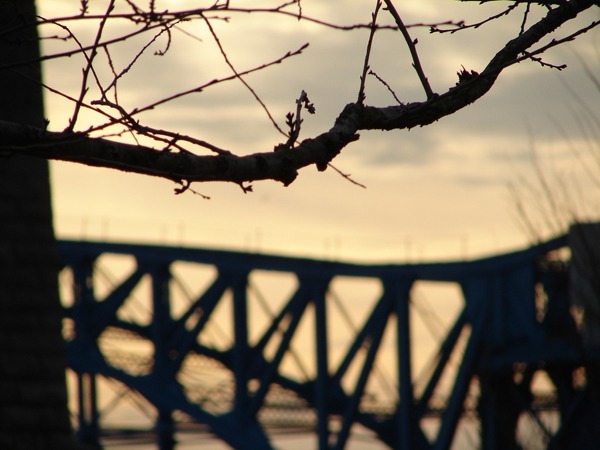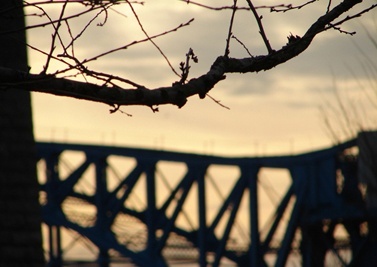
Wednesday, early March. My twelve-year-old son has the day off from school. It’s his older brother’s birthday and I need to bake a cake. Hudson and I decide to walk to the Lookout Mountain Market to get a mix and frosting. We take Boji, our yellow lab, along.
It’s the first sunny day in a week, warm, the kind of soft-focus, liquid air that makes me feel half-time and drowsy. Blots of color in yards along Lula Lake: purple crocus, yellow forsythia, green onion grass. Hudson yanks up a cluster and chucks it across the street, then smells his fingers. Will that grass make actual onions? he asks.
We walk a block and cross from Georgia into Tennessee, alongside the rock wall with built-in mailboxes in front of each house. Past the Civil War trenches—hospital, not battle—at the four-way stop where Lula Lake road becomes Scenic Highway. We wind along past the trailhead that leads, Hudson says, “to a sick cave.” I had no idea he’d been there, though it doesn’t surprise me: mountain kids grow up roaming free, climbing boulders, swimming in creeks. We reach the small ravine across from Watauga road and cross the metal replica of the Market Street bridge—this smaller version painted black, not blue like the full-size bridge in downtown Chattanooga.
I wave to Ruth on the patio of the Café on the Corner. She’s the owner and chef, keeps my favorite Cabernet in stock for half-price wine night. I spot Gwen—the “mountain tracker” social columnist—exiting the post office. My friend Melanie speed-walks past us, waves.
Everyone we see is white. I wish I could say this grim reality is still something I notice daily, as it was when we first moved here. The shameful truth: I rarely think about it anymore. Let freedom ring from Lookout Mountain of Tennessee—there’s a reason Martin Luther King singled out our town in his famous speech.
We reach the market and I sit outside with Boji while Hudson goes in to buy the mix and frosting and a snack for himself. A woman whose name I don’t know comes out of the market—I’ve been told she’s a “socialite.” She drives a convertible. Her young son is with her. They get into the car and a country song blares. I LOVE this song! she says, and high-fives her son, who’s drinking from a juice box. They sit there and listen, together.
On the way home Hudson kicks at the spiked seed pods lining the road. Boji sniffs at ivy, lifts his leg.
There he goes, I say. Reading his pee-mails, replying.
How much is Boji worth? Hudson asks.
He’s priceless to us, I say.
I mean his actual body, Hudson says.
I tell him how much we paid, when we bought Boji from the breeder. Hudson stops walking.
You bought him?
It hadn’t occurred to me that Hudson wouldn’t know this.
We bought him from his owner, I say.
You can’t own an animal, he says. You just take care of them, in your house.
I guess you’re right, in a sense, I say.
Like, humans can’t be owned, he says, and Boji’s pretty much human.
The dog sniffs, lifts, jogs ahead.
So how much is a human body worth, Hudson says.
And we’re off again.
The next day, driving Hudson to school, we pass Howard High School, in the inner city. We’ve passed it all year, but today it’s a late start and there are students outside.
Is that a private school for black kids? Hudson asks.
Actually, it’s public, I say.
But racism is illegal, right, he says.
How do you explain to a twelve-year-old? I wish I could say, Yes, darling: racism is illegal.
Mandatory segregation is illegal, I say.
It’s the best I can do, for now.
We get on I-24 and take the Sugar’s Ribs exit at Missionary Ridge, where a herd of kudzu-eating goats grazes the hillside. Hudson’s school, private, sits at the base of the ridge, where in 1863 Arthur MacArthur—the famous General Douglas’s father—charged the hillside and took Chattanooga for the Union, General Grant watching from Orchard Knob nearby.
The sun is already high above the ridge. I say goodbye to Hudson and drive back up the mountain, the city growing hazy below. Birdsong, pillared homes, pear trees laced in white blossom—another gorgeous Southern day made, it seems, to lull us into forgetfulness.
